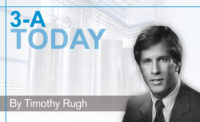The emergence of COVID-19 early this year precipitated immediate and far-ranging changes in all types of workplace learning. When it comes to ensuring food safety in equipment design and operation, COVID-19 did not change the imperative for training, but it accelerated the implementation of digital and virtual learning programs.
For perspective on some of the most significant industry impacts, we reached out to the 3-A Sanitary Standard Inc. (SSI) community for input on several questions:
What are some of the most significant ways your company has worked to adapt your training resources?
-
Developing webinars and regular meetings for collaboration of all functional groups.
-
Upgrading our online training tools infrastructure.
-
Investing in new media equipment for online trainings.
-
Implementing new online (collaboration) tools.
-
Broadening the online-training competencies within the team.
Most notable successes? Challenges? Surprises or unexpected benefits?
-
Supporting field operations problem-solving, which has resulted in early-career leadership growth in plants.
-
Converting technical hands-on trainings into effective online and/or blended learnings.
-
Developing our technical trainer competencies toward live online training.
-
Keeping learning efficiency, despite going from doing to showing.
Do you expect the changes you have made to endure in the post-COVID period?
-
Yes, we have found out that we are more efficient working from home and traveling to plants infrequently. Several departments and personnel will not return to headquarters on a regular basis post-COVID.
-
Expected focus will be on blended learning rather than pure face-to-face trainings.
-
Less classroom training/theoretical knowledge via online sessions (after COVID).
Anything else notable about your experience that we can mention?
-
Efficiency and flexibility are great. Employees who had heavy travel schedules and developed standards and issued reports from remote areas adapted quickly.
-
Developing concepts for live online trainings/video on demand.
-
Developing new interactive (online) training concepts.
The feedback reflected a common lament about losing the ability to engage the audience, as is characteristic of live seminars. It is apparent that all organizations were required to establish a coordinated cross-functional learning-response team to adapt to the new environment.
This required getting up to speed quickly on all of the planning and production elements to produce high-quality training products. In addition, taking some of the tactical steps evolved into broader strategic measures on effective virtual learning. For example, developing virtual-reality training simulations and higher-end moderated virtual classrooms, though more complex to create, offers new and different ways to deliver training in the post-COVID era.
Perhaps the most significant positive from the response planning for COVID-19 training is that it challenged organizations of all types to expand learning opportunities and improve learning overall. 3-A SSI is now planning its upcoming annual education program, “The Role of Hygienic Design in Food Safety Plans,” in a virtual format on May 17-18, 2021.
E-learning modules and other resources, available free in the Knowledge Center of 3-A SSI at www.3-a.org, should not be overlooked in supporting foundational training across the industry for equipment fabricators, food processors, regulatory sanitarians, students and young professionals beginning their careers. The modules include “Overview of Principles of Hygienic Design,” “Hygienic Equipment Design (Basic and Advanced),” “Hygienic Facility Design & Environmental Controls and Cleaning & Sanitizing.”
A new vlog series, “Ask the Expert,” also addresses special topics, including “Surface Finish in 3-A Sanitary Standards,” “Hygienic Welding: Quality and Inspection,” and “Applying 3-A Sanitary Standards and Accepted Practices to Cleaning Out-of-Place.”
Special thanks to the following contributors for this article: Rick Heiman, Dairy Farmers of America; Gabriel Miller, Pi-FS LLC; and Reinhard Moss, GEA Westfalia Separator Group GmbH.

